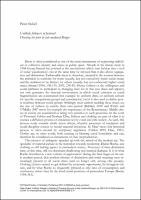Chapter Unlikely followers of fashion? Dressing the poor in late medieval Bruges
Abstract
Surprisingly little is known about the way the poor strata of urban society in the late medieval period used dress to express social identities. Systematic empirical data have not been available, and sources tend to illustrate the opinion of the elites about poverty. Through the analysis of cloth distribution by charitable institutions and, above all, of a unique set of inventories for fifteenth-century Bruges, it becomes clear that dress was not only an important element in the material culture and the construction of social identity of the poor, but that instead of being a passive player depending on charity and alternative commercial circuits, the poor used dress to conform to fashion cycles set by the wealthier groups in urban society. In late medieval Bruges, they were wearing the same typology of dress, the same colours and the same fabrics, displaying in this way a willingness to participate and invest in fashion cycles. In assessing both urban economies and social dialogue, scholars should therefore not focus on elite demand alone.


 Download
Download Web Shop
Web Shop